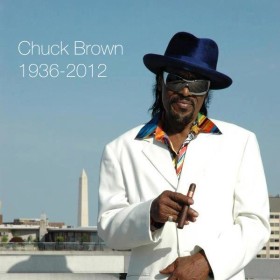
Chuck Brown
He moved to Washington, DC in 1942, and at 15-years-old he started to live on the streets. He did not graduate high school; Brown quit school and decided to perform odd jobs to make money, including shining shoes. In the 1950s, Brown was convicted of murder and served 8 years in Lorton Correctional Complex. At first, it was tried as aggravated assault; however, it was moved up to murder once the victim died. Brown believed that his actions were in self-defense. There, he traded cigarettes for a guitar, which launched his love for the guitar. When Chuck Brown’s sentence was up, he moved back to Washington, DC and worked as a truck driver, a bricklayer, and a sparring partner at multiple boxing gyms. He also started to perform at parties throughout the area; however, he could not play at places that served liquor because his parole officer would not allow it.
Chuck Brown, known as the “Godfather of Go-Go,” played with Jerry Butler and The Earls of Rhythm in the early 1960s, and later joined Latin-American band Los Latinos. His hit songs include “I Need Some Money” and “Bustin’ Loose.” Chuck Brown was considered a local legend in Washington, DC. Darryl Brooks, a local promoter who worked with Chuck Brown during his career, stated, “He was a symbol of D.C. manhood, back in the day, because of the authority that he spoke with. He just spoke from a perspective that black men could understand.” Andre Johnson, the leader of the go-go band Rare Essence, said that Chuck Brown “influenced generations of people—not just one—a few generations of musicians around here.”Washington, DC Mayor Vincent Gray said Brown was “Go-Go’s creator and, arguably, its most legendary artist.”

